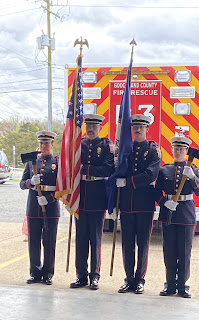On March 25 about 75 citizens gathered at Salem Baptist Church for the spring District 4 Town Hall. It was the first meeting in D4 since last May’s disastrous presentation of the last—and worst—version of a proposed Centerville small area plan. Drastic changes made to the proposed plan with no explanation or justification that ignored more than a year of thoughtful constructive citizen feedback generated such vigorous opposition that the supervisors rejected its adoption.
Town hall meetings were held across the county during March
and followed the same basic format (recordings of each are archived on the
county website, goochlandva.us, under the “watch county meetings tab). These
sessions provide a casual way for Goochlanders to interact with their elected
and appointed officials to learn about the activities of local government.
County Administrator Vic Carpenter presented a summary
of the proposed budget for FY25, which begins on July 1. It prioritizes public
safety—law enforcement, animal protection, fire-rescue—and education. He
thanked the attendees for their interest that makes Goochland a great place to
live.
The budget process takes a conservative approach,
explained Carpenter, to enable the county to withstand negative impacts of unknowns
like a possible recession. Most of the county’s revenue comes from property
taxes. While assessed valuations have increased, so has inflation complicating
the process. He also touted our “triple triple,” three AAA bond ratings, making
Goochland the smallest county population wise to earn this designation of
fiscal health. The 53 cents per $100 of valuation has been in place since 2007,
but rising demands for service and cost to provide them highlight the need for revenues
from commercial development.
Carpenter outlined upcoming road projects (see the transportation
tab on the county website). He reiterated that the signalized intersection of
Hockett and Broad Street Road will not change after the realignment of Hockett and
Ashland Road.
Goochland is growing and graying, the average age of our
population is over 65, said Carpenter. This increases demand for emergency
medical service, whose costs are also rising. Aside from the burgeoning price
tags on fire trucks and ambulances, gone are the days when dedicated and
well-trained fire-rescue volunteers gave freely of their time and talents to
save lives and protect property, saving the county millions of dollars.
In response to a question, Carpenter acknowledged that
there are no parks greenspace, or a convenience center in the east end. He said
that “conversations” about public amenities there are underway but did not
elaborate.
Carpenter introduced Josh Gillespie, who was recently
hired as deputy county administrator and will start work in April.
Board of Supervisors’ chair Charlie Vaughters D4 thanked
county staff for all the work they put in to hold the town hall meetings. He
said the notion of “graceful growth” is too soft. “Goochland wants the best
growth unequivocally. What happens 50 feet across the county line in Henrico is
not what happens in Goochland.”
Vaughters contended that Goochland can have the best
growth, provide the best services, and live up to a best-in-class mentality.
Vaughters said he hopes that citizens appreciate that county resources are the
result of individuals who work hard to make it happen and hopes “that we can
continue to grow on that.”
Superintendent of Goochland Schools Michael Cromartie,
Ed. D. shared the accomplishments of our wonderful school division, which has
been rated number one in the Richmond Region by Niche.com for seven consecutive
years. He discussed the challenges of recruiting and retaining the teachers and
staff that provide exceptional learning opportunities for our children. Increasing
teacher salaries to the regional mean would help Goochland compete with the
deep pockets of neighboring jurisdictions.
Cromartie said that excellent schools have a positive
impact on local property values. Home prices in Goochland are the highest in
the region, which adds another layer of complication to the recruitment and
retention issue. Teachers cannot afford to live in Goochland, and many have
long commutes.
Considered by the state to be an affluent county,
Goochland pays 80 percent of the cost of public education, the remainder coming
from the state. Henrico receives a much higher percentage of support from the
Commonwealth and also levies a meals tax to fund education, that Goochlanders
pay when dining out east of the border.
Cromartie did not mention the $1.4 million he
requested above the approved school budget to close the salary gaps, or that
the school division may need to forego purchase of a school bus to cover a larger
than anticipated increase in health insurance premiums.
The supervisors will hold a public hearing on the
proposed budget and fee increases at 6 p.m. on Tuesday April 2. It will be
interesting to see if there will be revision to enhance salaries to help our
law enforcement, fire-rescue, and schools can compete for the best people with
our deep pocked neighbors. Final adoption and setting of tax rates and fees for
calendar year 2024 will take place on April 16.













.png)



